Related Research Articles
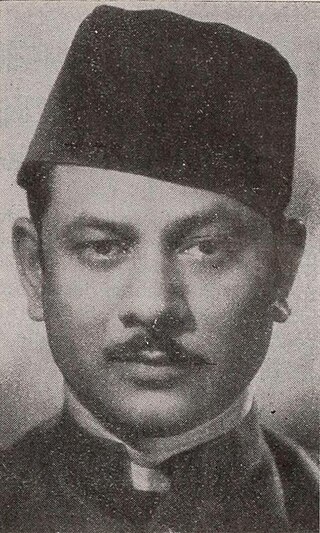
Mehboob Khan was a pioneer producer-director of Indian cinema, best known for directing the social epic Mother India (1957), which won the Filmfare Awards for Best Film and Best Director, two National Film Awards, and was a nominee for the Academy Award for Best Foreign Language Film. He set up his production company – Mehboob Productions, and later a film studio – Mehboob Studios in Bandra, Mumbai in 1954. He also created the dacoit film genre with Aurat (1940) and Mother India, and is also known for other blockbusters including the romantic drama Andaz (1949), the swashbuckling musical Aan (1951), and the melodrama Amar (1954).
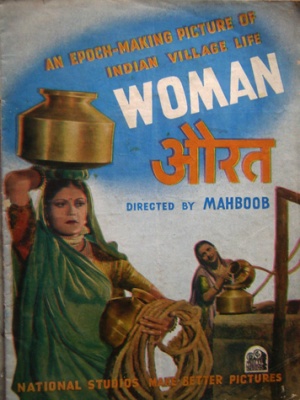
Aurat, also known by its English title Woman, is a 1940 Indian film directed by Mehboob Khan and starring Sardar Akhtar, Surendra, Yakub, Kanhaiyalal and Arun Kumar Ahuja. The film's music is by Anil Biswas and dialogue is by Wajahat Mirza. Mehboob Khan later remade this film as Mother India (1957), which is considered one of the biggest hits of all time in Indian Cinema.
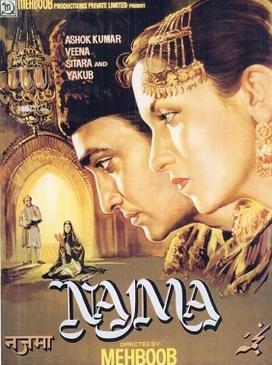
Najma is a 1943 Indian film directed by Mehboob Khan and starring Ashok Kumar and Veena. The film's music is by Rafiq Ghaznavi and lyrics by Anjum Pilibhiti.

Mehboob Studio is an Indian film studio and recording studio in Bandra (W), Mumbai, founded in 1954 by director and producer Mehboob Khan, who previously owned Mehboob Productions, and is most known for films such as Mother India (1957), which won the Filmfare Awards for Best Film and Best Director and was a nominee for the Academy Award for Best Foreign Language Film.
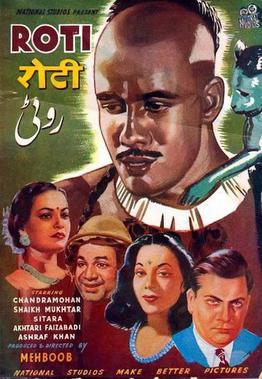
Roti is a 1942 Indian Hindi film directed by Mehboob Khan. This movie was anti-capitalist.
Faredoon A. Irani was an Indian cinematographer who worked in Hindi films. He shot Mehboob Khan's films Andaz (1949), Aan (1952) and Mother India (1958).
Ek Hi Raasta is a 1939 Hindi social film directed by Mehboob Khan. The director of photography was Faredoon Irani with story by Babubhai A. Mehta and Wajahat Mirza. The film was produced by Sagar Movietone. The cast included Arun Kumar Ahuja, Sheikh Mukhtar, Anuradha, Kanhaiyalal and Harish. This was the debut film of Sheikh Mukhtar, who went on to act in and direct several successful films, and Arun Kumar Ahuja, a prominent actor in the 1940s. Ek Hi Raasta is a film about wrongs of society and its laws. It was one of the early Hindi films to make a noticeable application of WW II.
Hum Tum Aur Woh is a 1938 Hindi/Urdu social drama film. The film was directed by Mehboob Khan for Sagar Movietone. The music was composed by Anil Biswas with lyrics by Wajahat Mirza and Zia Sarhadi. The cinematographer was Faredoon Irani. The film starred Motilal, Maya Banerjee, Rose, Yakub and Sankatha Prasad. The film was a romantic triangle involving Moti (Motilal), Bina the girl he's engaged to and Leela (Rose) who is obsessed with him.

Watan (transl. Homeland) is a 1938 Hindustani costume drama film directed by Mehboob Khan. Produced by Sagar Films, the film had story by Mehboob Khan and Wajahat Mirza. The cinematographer, as for most Sagar films, was Faredoon Irani. Following the successful music of Manmohan (1936), Sagar Movietone retained Anil Biswas as the in-house music director, scoring music for Watan along with other releases of the time from the studio. The cast of the film included Kumar, Bibbo, Maya Banerjee, Yakub Lala, Sitara Devi and Kayam Ali.
Manmohan is a 1936 Indian Urdu/Hindi-language romantic tragedy film directed by Mehboob Khan. This was Khan's third film for Sagar Movietone after Al Hilal (1935) and Deccan Queen (1936). The cinematographer was Faredoon Irani who, starting from Mehboob Khan's Al Hilal (1935), went on to establish a long working relationship with him lasting till Khan's last film Son of India (1962). The music was composed by Ashok Ghosh assisted by Anil Biswas. The story writer was Zia Sarhadi who also wrote the lyrics, screenplay and dialogue in addition to acting in the film. Though he had started his writing career on Khan's backing for Deccan Queen (1936), it was with Manmohan that he achieved success. The film was inspired by Devdas, (1935), which was a big hit at the box office. Surendra was chosen as the singing star to rival K. L. Saigal from New Theatres Calcutta, whose songs from Devdas had mesmerised the nation. Though Manmohan was referred to as the "poor man's Devdas" the film went on to do well and the songs became very popular. The film starred Bibbo, Surendra, Yakub, Kayam Ali, Bhudo Advani and Mehdi Raza.
Deccan Queen is a 1936 Hindustani action-adventure film directed by Mehboob Khan. It was the first "stunt" film from Sagar Movietone and the first film for actor Surendra, who was credited as "Surendra Nath B.A., L.L.B.". The film helped launch him as a singing star. This was the only action film directed by Mehboob Khan as he later shifted to films with social and political slant. This was Mehboob Khan's second directorial venture after Al Hilal (1935). He asked Zia Sarhadi then an unknown small-time actor, to write the screenplay, dialogue and songs for Deccan Queen. The music direction was by Pransukh Nayak along with Ashok Ghosh. The cinematographer was Faredoon Irani. The film starred Surendra, Aruna Devi, Ramchandra Pal and Kayam Ali.
Jagirdar (Landlord) is a 1937 Hindi romantic melodrama film directed by Mehboob Khan, and starring Bibbo, Motilal, Surendra, Yakub, Pande, Sankatha Prasad, Pesi Patel and Maya Banerjee.

Anokhi Ada is a 1948 romantic Hindi film directed by Mehboob Khan. The story was by Zia Sarhadi, with screenplay and dialogue by Agha Jani Kashmiri. The music composer was Naushad, assisted by Ghulam Mohammed and the lyricists were Shakeel Badayuni and Anjum Pilibhiti. The director of photography was Faredoon Irani. It was produced under the Mehboob Productions banner and starred Naseem Banu, Surendra, Prem Adib, Zeb Qureshi, Reehan, Pratima Devi and Cuckoo.
Vengeance is Mine also called Vair Ka Badla is a 1935 social Hindi film directed by Sarvottam Badami based on K. M. Munshi's story. After directing three regional language films for Sagar Movietone, Badami was now directing films exclusively in Hindi. After the first Hindi film he directed Chandrahasa (1933), he shifted his focus to socially relevant topics and made two films based on Munshi's stories, Vengeance is Mine (1935) and Dr. Madhurika (1935). Vengeance is Mine was made on a story Munshi had written in Gujarati language as "Ver Ni Vasulat" in 1913 under the nom de plume "Ghanshyam". The cast included Kumar, Sabita Devi, Yakub, Sitara Devi, Padma Devi and Mehboob Khan.
Grama Kanya is a 1936 Hindi melodrama film directed by Sarvottam Badami. The film produced by Sagar Movietone had cinematography by Faredoon Irani, story by Jayant Shyam and dialogue by Waqif. The music was composed by the renowned bhajan singer Shankarrao Khatu. The cast included Surendra, Sabita Devi, Yakub, Aruna, Kayam Ali, and Gulzar.

Do Diwane also known as Be Kharab Jan, is a 1936 Hindi/Gujarati comedy film directed by Chimanlal Luhar based on K. M. Munshi's famous play Be Kharab Jan. The film was produced by Sagar Movietone and had music composed by Pransukh Nayak with cinematography by Keki Mistry. The cast included Shobhana Samarth, Motilal, Yakub, Aruna Devi, Rama Devi, Kamalabai, Kayam Ali, Pande and Pesi Patel.

Surendra was an Indian singer-actor of Hindi films. Known by his mononym, Surendra was born and educated in Punjab to be a lawyer by profession. He came to Bombay to become a singer on the recommendation of a Delhi distributor and his friends. He was "picked" by Mehboob Khan whom he met at Sagar Movietone, to sing and act in films as an alternative to the then Calcutta-based singer-actor, K. L. Saigal. Surendra started his career with his debut starring role in Deccan Queen (1936), directed by Mehboob Khan. He soon became a part of Sagar Movietone when his song "Birha Ki Aag Lagi More Man Mein" from the film became an "instant hit".
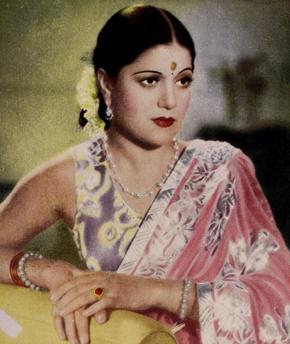
Sardar Akhtar (1915–1986) was an Indian actress who worked in Hindi and Urdu films. She started her acting career on the Urdu stage. Her early films were with Saroj Movietone, where she did a majority of stunt (action) roles. She came into prominence as the washer-woman in the role of Rami Dhoban in Sohrab Modi's Pukar (1939). As a woman seeking justice for the death of her husband, it was a breakthrough role for her. A popular song she sang in the film was "Kaheko Mohe Chhede". Her career defining role was as a "peasant woman" deserted by her husband, in Mehboob Khan's Aurat (1940), a role later made famous by Nargis in Mehboob's remake Mother India.
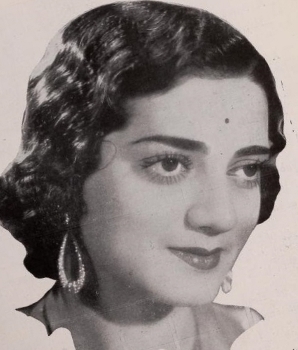
Sabita Devi (1914–1965) was a Hindi film actress in Indian cinema. She is stated to be one of the "prominent" leading ladies of the "pioneering era" of Indian cinema along with Mehtab, Bibbo, Durga Khote, Gohar, Devika Rani and Seeta Devi. A Jewish by birth, she changed her name to find acceptability in Hindi cinema like the other Anglo-Indian and Jewish actresses of her time, Sulochana, Seeta Devi, Madhuri, and Manorama. After initially working with British Dominion Films Ltd., Calcutta, she shifted to Bombay and performed mainly in films produced by Sagar Movietone with her co-star in most films being Motilal. Some of the popular films with Motilal were Dr. Madhurika (1935) and Kulvadhu (1937) directed by Sarvottam Badami. Their first film together was Shaher Ka Jadoo (1934), which was also Motilal's debut film, and then Lagna Bandhan (1936) both directed by Kaliprasad Ghosh. She acted in Silver King (1935) with Motilal. It was an action film directed by C. M. Luhar, which became a "huge success".

Sagar Movietone also Sagar Films, Sagar Film Company and Sagar Productions was an Indian film production company involved in the making of films for Indian cinema. It was launched by Ardeshir Irani with Chimanlal Desai and Dr. Ambalal Patel in 1929 in Bombay, Maharashtra, India. Sagar was initially started as a branch company of Ardeshir's Imperial Film Company. Several key figures from Imperial, such as Mehboob Khan were shifted to Sagar. The studio was in operation from 1930 to 1939. In 1940, it combined with General Pictures to form National Studios. It made "Parsi theatre based films, mythologicals and stunt movies". Sagar fostered the career of many artists who rose to prominence. Early directors such as Prafulla Ghosh, Sarvottam Badami, Ezra Mir and Nanubhai Vakil were promoted by the company. Mehboob Khan got his first break as a director in Al Hilal in 1935. He was referred to as "the most important alumnus" from Sagar, who went on to become one of Indian cinema's "most influential film-makers".
References
- ↑ Jonathan Crow (2016). "Judgement-of-Allah - Cast - Showtimes - NYTimes.com". Movies & TV Dept. The New York Times . Baseline & All Movie Guide. Archived from the original on 5 March 2016. Retrieved 23 September 2020.
{{cite web}}: CS1 maint: unfit URL (link) - ↑ "Film & Television Producers Guild of India – Mehboob Khan Founder Member". filmtvguildindia.org. The Film & Television Producers Guild of India Ltd. Archived from the original on 30 March 2015. Retrieved 7 September 2014.
- ↑ Abootty (4 April 2014). "Remembering the Pioneer of Indian Cinema". The New Indian Express. Indian Express. Archived from the original on 7 September 2014.
- ↑ Ahmed, Rauf (2008). Mehboob Khan The Legends of Indian Cinema Series. India: Wisdom Tree. p. 21. ISBN 9788183281065.
- 1 2 "Judgement of Allah 1935". MuVyz. Retrieved 7 September 2014.
- ↑ "Al Hilal 1935". citwf.com. Alan Goble. Retrieved 7 September 2014.
- ↑ Likhi, Abhilaksh (19 September 1999). "The master of melodrama". The Tribune Sunday Reading. The Tribune. The Tribune Sunday.
- ↑ Ahmed, Rauf (2008). Mehboob Khan The Legends of Indian Cinema Series. Delhi, India: Wisdom Tree. p. 23. ISBN 9788183281065.